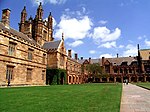University of Sydney Business School
| Type | Public |
|---|---|
| Established | 1920 |
| Dean | Peter Wolnizer |
| Location | , , |
| Affiliations | University of Sydney |
| Website | www.econ.usyd.edu.au |
The University of Sydney Business School is a constituent body of the University of Sydney, Australia. It was established in 1920 and is the oldest faculty of its kind in Australia.
Since 1999 the Dean of the Faculty has been Professor Peter Wolnizer.
In 2009, it had a total student enrollment of 8,389 (18% of all students), consisting of 4,161 undergraduate students and 4,228 postgraduate students.[1] By total enrollment numbers, the Faculty is the University's second-largest.
Located principally in the Darlington section of the main campus of the University of Sydney, the three main buildings of the Faculty are: the Merewether Building; the Economics and Business Building; the Institute Building and its Storie Dixon Wing.
By large margins, the Faculty of Economics and Business has the greatest number and proportion of international students than any of the University of Sydney's sixteen faculties. In 2008, 49% of the Faculty's enrollment consisted of international students, more than double the University-wide rate of 22%. More specifically, 34% of undergraduate and 63% of postgraduate students were international. It contained 4,077 of the University's international students out of 9,917, 41% of the total. It contains considerable numbers of international students in proportion to its size: the Faculty comprises 18% of the University's total student enrollment yet contains almost half of its international students.[2][3][4]
It was the first Faculty in Australia to receive accreditation by the Association to Advance Collegiate Schools of Business (AACSB)[5] and the European Quality Improvement System (EQUIS) from the European Foundation for Management Development.[6]

History
Established in 1920 as the Faculty of Economics (later to become the Faculty of Economics and Business), it initially offered the Bachelor of Economics degree which commenced in 1930. The Master of Economics postgraduate degree commenced in 1970.
In 1985 the Faculty introduced its second undergraduate and postgraduate degree programs, the Bachelor of Economic and Social Sciences and the Master of Economic and Social Sciences respectively.
In 1993 the third undergraduate degree program was introduced, the Bachelor of Commerce. The Master of International Studies commenced in 1991. The Master of Commerce commenced in 1995. The Master of International Business commenced in 1999.
In 2005, the Faculty of Economics and Business ended its association with the jointly run Australian Graduate School of Management with the University of New South Wales.
In 2011, the Faculty of Economics and Business was renamed to Business School. The Discipline of Economics was moved from the Faculty to the Faculty of Arts and Social Sciences, becoming the School of Economics within it.
Organisation
The Faculty of Economics and Business consists of 9 disciplines. These are:
- Discipline of Accounting
- Discipline of Business Information Systems
- Discipline of Business Law
- Discipline of Operations Management and Econometrics
- Discipline of Economics
- Discipline of Finance
- Discipline of International Business
- Discipline of Marketing
- Discipline of Work and Organisational Studies
Due to a restructure in the vision of the Faculty, in 2008 the Faculty's former Department of Government and International Relations and the Department of Political Economy was relocated to a new School of Social and Political Sciences in the University's Faculty of Arts.
In addition to the above disciplines, the Faculty of Economics and Business also provides postgraduate studies and research through the Centre for International Security Studies; the Institute of Transport and Logistics Studies; the Workplace Research Centre (formerly known as ACCIRT); and the Graduate School of Government.[7]
Professional accreditation
Studies in accounting are recognised by CPA Australia and the Institute of Chartered Accountants of Australia (ICAA).
A major in Industrial Relations and Human Resource Management can be accredited at member level by the Australian Human Resource Institute (AHRI).
An extended major in Business Information Systems can be accredited by the Australian Computer Society.[8]
Faculty journals
- Abacus
- Accounting, Auditing & Accountability Journal
- Australian Accounting Review
- Australian Review of Public Affairs
- Australian Tax Forum
- International Journal of Development Issues
- International Journal of Forecasting
- International Journal of Information Management
- International Journal of Management Reviews
- Journal of Australian Political Economy
- Journal of Industrial Relations
- Journal of International Financial Management & Accounting
- Labour History
Alumni
The Faculty has produced many graduates of prominence, including (listed alphabetically by surname with all degrees obtained from the Faculty):
- Anthony Albanese, B.Ec. 1984, Australian Labor politician
- John L. Carrick, B.Ec. 1941, Australian Liberal politician
- David S. Clarke, B.Ec. (Hons), Chairman, Macquarie Bank Limited (1985—)
- Greg Combet, B.Ec. 1987, Graduate Diploma of Labour Relations and the Law 1991, Australian Labor politician (2007—)
- Prof. Margaret Gardner, B.Ec. (Hons) 1976, Ph.D. (Econ) 1984, Vice-Chancellor and President of RMIT University in Melbourne
- Nick Greiner, B.Ec. (Hons), Australian Liberal politician, 37th Premier of New South Wales (1988–1992)
- Morris Iemma, B.Ec., Australian Labor politician, 40th Premier of New South Wales (2005-2008)
- Justice Michael Kirby, B.Ec., Justice of the High Court of Australia
- Mark Latham, B.Ec., Australian Labor politician, Leader of the Australian Labor Party and Opposition Leader of Australia (2003–2005)
- Malcolm Mackerras, B.Ec. 1962, commentator, psephologist
- Glenn Stevens, B.Ec. (Hons) 1979, 7th Governor of the Reserve Bank of Australia (2006—)
References
- ^ 2009 University of Sydney Enrolment Statistics
- ^ http://www.planning.usyd.edu.au/statistics/stats.htm
- ^ http://www.planning.usyd.edu.au/statistics/enrol/enr07/intnlcur0.htm
- ^ http://www.planning.usyd.edu.au/statistics/enrol/enr07/enrfac1t.asp
- ^ Association to Advance Collegiate Schools of Business - Schools Accredited in Business, retrieved on 2008-01-15.
- ^ European Quality Improvement System Accredited Members, retrieved on 2008-01-15.
- ^ Faculty of Economics and Business - Organisation, retrieved on 2008-01-15.
- ^ Quality Assurance and Professional Accreditation - Faculty of Economics and Business, retrieved on 2008-01-15.
External links

